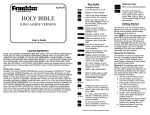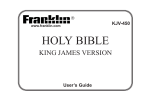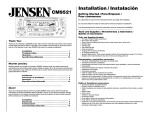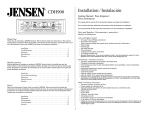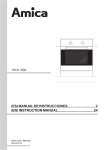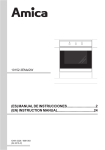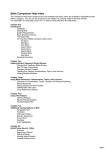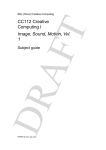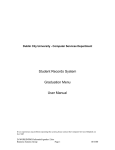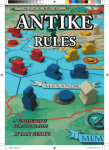Download 10 Commandments of Bible Reading
Transcript
Bible in an Hour® is a registered trademark of In an Hour, Inc. All intellectual property rights on this material are owned by Wade E. Butler founder and CEO of In an Hour, Inc. Bible in an Hour® ©2003 Wade E. Butler California Partnership Worldwide 2 CONTENTS Introduction Commandment One: Remember that the Bible isn’t one book. Commandment Two: Remember that the Bible isn’t magic. Commandment Three: Remember that the Bible isn’t all that long. Commandment Four: Remember that you don’t have to be a genius to understand it. Commandment Five: Remember that most people need to read the Bible. Commandment Six: Remember that the Bible wasn’t written in English. Commandment Seven: Remember that the Bible wasn’t written yesterday. Commandment Eight: Remember that the Bible wasn’t written by one person. Commandment Nine: Remember that the Bible should be read at face value. Commandment Ten: Remember that the Bible is not a Human ‘User’s Manual.’ 3 Introduction Most people want to know what the Bible says. They try to read it and make every effort to know what it says, but they get lost. They have all of the good intentions when they begin, but they are soon tangled hopelessly in the names and places of the Bible. They are also caught in the mystical understanding of the Bible. I should say the mystical aura of the Bible. They have been told that the Bible is so difficult that they need to have a leader to tell them what it is and means. In this way, religious leaders have held the people in abeyance, hoping that they will not read the Bible for fear they might get it wrong. It is not that leaders want to keep the Bible from the people. It is that most people don’t understand what it takes to read the Bible and for some reason, no one seems to have told the people what it takes to read the Bible with benefit. This is what I want to fix. So I want to begin by setting up the rules for reading the Bible so that a well-meaning person who wants to read the Bible will be able to do so with profit and benefit and will be conversant in the themes that are in it. To do this, those who want to read it need to understand a few things about the Bible before they ever open the cover and set eyes on a word. 4 The Ten Commandments of Bible Reading So you want to understand the Bible! You can! The Bible isn’t difficult to understand. It is not written in mysterious words. It is not written to confuse. It is like any other written document insofar as the basic mechanics. The Bible contains words on a page just like any other set of books. If you can read at all, you can read the Bible. You do not have to have a special reading ability. You do not have to have a special education. You do not have to be a medium, theologian, or pastor. You do not have to believe what the Bible says. It does not take a special faith to read and understand the Bible any more than any other collection of writings. So many people have the idea that the Bible is out of their reach. They have come to believe that the Bible is too difficult for the common man to understand. This is not the case. Many of those who try to teach the Bible intentionally or unintentionally make it difficult by making people flip here and there. The fact is that the Bible is simply a collection of written documents that anyone who can read can read. If you know just these ten facts, the Bible will open up to you like you have always wanted. Remember these ten amazing 5 insider facts and you will be much closer to understanding the Bible than when you started! Commandment One: Remember that the Bible isn’t one book. Most people do not understand that the Bible is not one single book. It is a collection of 66 books, or better, 66 different parts. Each part is separate and distinct. The fact that most Bibles are published in one volume has given the mistaken notion that the Bible is one book. These 66 parts have been collected over the years into one place and published as one thing. But it never has been and is not now one book. People refer to the Bible as one thing. This adds to the confusion. The Bible is not one thing. It is 66 things. These 66 things are collected into one spot. This does not mean that the 66 different things have become one. Each part is named by the subject, the author, or the intended audience. So Exodus is about the exit of the people from Egypt. Leviticus is about the rules and regulations needed for the sacrifices that God commanded. God commanded that the Levite tribe take care of the sacrificial system that he created. Hosea was written by Hosea, Amos by Amos, and Joel by Joel. This is not guesswork. The part itself identifies the writer or the subject in the first line. Philippians was written to the people at Philippi and the Ephesians to the people of Ephesus. 6 Commandment Two: Remember that the Bible isn’t magic. The words of the Bible are not like talismans or incantations. You cannot flop the book open and expect to see answers to your particular problem. That is what the I-Ching is supposed to do, not the Bible. The Bible never claims to be magic. It never claims to be supernatural or mystical. The Bible does not bring havoc on people who throw it away or bring luck to people who keep it by the bedside. It is not a lucky charm or a potion. The Bible is not a book of charms and magic formulas. There have been many superstitions taught about the Bible and none of them are true. The Bible is a collection of books, not a magic book of power or any such thing. Commandment Three: Remember that the Bible isn’t all that long. People seem to have it in their minds that the Bible is way too long to read. They look at the Bible and seem to believe that it would take a lifetime to read it. They fear it. It seems endless. It seems like there is too much for one person to ever think of reading. 7 But the truth is that the Bible isn’t much longer than James Michener, James Clavell, and Stephen King novels. There are many books written that are far longer than the set of books contained in the Bible. The Bible is in a leather cover and that makes it seem like it cannot be approached. That is unfortunate because Bibles were published in leather for the very reason that Bibles were read. In order to make a Bible last through the many readings and rereadings, leather covers were introduced so that readers would not have to keep getting the Bibles rebound or buying new ones. Now it seems that the very cover puts people off from reading the Bible. Commandment Four: Remember that you don’t have to be a genius to understand it. Clergypersons, over the years, have given the person in the pew, the common reader of the Bible, the idea that you need a Master’s degree and high IQ to understand the Bible. By constantly referring to the original Hebrew and Greek texts, the impression is given that those languages have to be known to truly be able to understand the Bible. Preachers act mysterious about the Bible as well and give the wrong impression to those who want to read the Bible for themselves. In order to prepare sermons, many clerics take a passage here and a passage there and assemble moralistic speeches. This gives the impression that to understand any of the Bible one has to 8 understand the entire Bible. Sometimes, clerics do not make any sense. They wander all over the Bible and give the impression that the Bible makes as much sense as they do. That can be very little. People become confused and think that, if the Bible confuses the cleric, it would be hopeless for the common person to ever hope to understand the Bible. So they never try. It is very popular these days for some preachers to attempt to interest parishioners with sermon titles like “The 17 Secrets of a Happy Life” or “21 Bible Ways to Have a Decent Marriage.” This approach makes the Bible seem like a mine of secrets and keys that the intimated will be able to find and use for the better life. This was never the intention of the writers of the Bible. They simply recorded the things that God did to them, for them, and with them. Commandment Five: Remember that most people need to read the Bible. The Bible has influenced in a great way most of Western culture, Semitic culture, and world religions. There are so many references to it, allusions to it, arguments about it, and religions that have come from it that most people, just to be part of the culture in a meaningful way, need to read it at least once. It is on all of the must-read lists of great literature. The Bible has so permeated the culture of the United States that to know nothing of the Bible seriously hampers a person’s 9 understanding of the mind set of the common individual. To have the slightest understanding of the religious culture of the U.S., one should read the Bible. Most people have an idea of what the Bible says and commands. They have a notion of what should be or may be in the Bible, but since they have never read the Bible, they only have notions and not knowledge. They have an idea of what the Bible says since they have collected notions about the Bible in the culture, but they have never taken the step to collect direct knowledge. This is a shame since the only way to know a book is to read a book. Not about a book or lessons on a book. No, one has to read a book to know what a book says. Commandment Six: Remember that the Bible wasn’t written in English. Most of the Bible was written in Hebrew. This makes the Bible a profoundly Jewish set of books. Jews wrote all of the Bible. Most people seem to think that the Bible is a Christian book in the strictest sense. Not true. The parts of the Bible that were not written in Hebrew were written in Greek. Even then, most of the people who wrote the Bible in Greek were Jews. 10 Again, the Bible is a Jewish collection of books. Those who wrote as Christians were by birth Jews and became Christians. The Bible was not written by a group of fundamentalist, U.S.-born white Christians. No, the Bible was written by Jews in Hebrew and Greek. It was never written in English. Since the Bible was finished and being copied long before English existed, any Bible in English is a translation from the Hebrew and Greek copies that still exist. There are many translations. There are many attempts to clearly translate the Bible into English. A version is another name for a translation. There are many translations, or versions, but there are not different versions of the Bible itself. There is not a variety of Bibles that exists. There is one Bible with many English versions. There are not many Bible versions and many English translations of those versions–just many translations of one Bible. (Of course, the Bible has also been translated into many other languages as well.) One Bible, many translations (versions). Some groups always think that they can translate the Bible better and more precisely than the ones who did it before. When people fuss over which version is right, they do not mean which Bible is right, they mean which translation they prefer. Many people want to understand the Bible, so a great deal of money is made in Bible sales. A new translation of the ONE 11 Bible offers the hope that the Bible might be easier to understand this time around and they pay millions of dollars a year to find out. Commandment Seven: Remember that the Bible wasn’t written yesterday. I am amazed at how people, in an effort to make the books of the Bible relevant, act like the books were written last year. The Bible is very old. The most recent book in the collection of 66 is nearly 2000 years old. Many of the books are at least 2,000 years older. Some of the earliest books were orally transmitted before they were written down. When they were written, they were written on scrolls and parchments made out of animal skins. Finally, they were collected into what we know as the Bible. Because the Bible is so old, it should not shock anyone that the modern reader will be confused now and then. The writers of the books of the Bible spoke of people, nations, and customs with which they were familiar. Of course, the modern reader is not familiar with the same people, nations, and customs. For instance, very few people understand who the Canaanites, Jebusites, Babylonians, Egyptians, or the Persians were. Yet, the writers of the books of the Bible were very familiar with such people. They were as common to them as the French or the Canadians are to those in the 20th Century. These nations were not allegorical. They were real people with real governments. 12 During the Bible times (5000 years ago) it was common for a nation to be ruled by kings, emperors, or other autocrats. The modern reader finds such concepts difficult. A king who has absolute authority over life and death seems incomprehensible to most 21st Century people. The people in the Bible also had customs that modern readers find offensive and which the Bible writers found commonplace. For instance, it was not unusual for a man to have many wives. In fact, for a king it was expected as a gesture of good will and treaty for a king to take a wife from the royal line of another kingdom to seal treaties and other agreements. If the modern reader understands these marriages to be like the ones entered into today, they will be misled. In Bible times, slavery was a common thing. Everyone had slaves. If one nation conquered another, the people in the conquered nation were subject to being made slaves. Some of their lives were very harsh, but most of the slaves were brought into the families of those who owned them. In Bible times, the society was absolutely patriarchal. The women were treated like property and had very little to say about anything including who they would marry. This was done so that the family line and the family property would go where the patriarch wanted it to go, namely, to his heir in the family line. It is not that women were not loved, they were. It is not that women were treated as objects, they weren’t. 13 They simply did not have any say in property ownership or their own destiny. Men longed for sons. The reason they longed for sons was because only sons would be allowed to inherit the property of the father, and the father was always concerned about the continuance of the family line and the family name. To have one’s name erased from the earth was like never having been in the first place. This was unthinkable to most people in the ancient world. No, the Bible was not written yesterday. To think that one can read the Bible and not expect to run into cultures, societies, governments, and customs that are foreign to the modern mind is illogical. The people who wrote the Bible were real people who lived in real time. The people with whom they interacted were real as well. The fact that they would record and report this interacting should be a matter of course when reading the Bible. This makes the books of the Bible difficult to understand for some people. They run to Bibles with little notes at the bottom of the page to explain the parts that are difficult. They buy Bible handbooks and think that they cannot read the books of the Bible without having one type of aid or another. This is not true. If the reader is somewhat familiar with ancient history (and by somewhat, I mean knowing the main cultures of the ancient near east, not be a history major) they will do fine in their reading. 14 Another misconception is that the Bible people and societies were not populous or sophisticated. The ancient world was very populated. Millions of people lived in a very small area. Millions. Their society was very specialized and multilayered. Just because they didn’t have air conditioning and Wal-Mart doesn’t mean they were backward. These people discovered or created writing, math, alphabets, geometry, calculus, iron, and bronze. They dreamed up and built chariots, catapults, and many other machines and inventions that we take for granted and upon which other new inventions are dependent. They dressed differently, lived differently, had different social roles and mores, used different measurements and money and spoke different languages. None of this makes the books of the Bible impossible to understand or appreciate. A basic understanding of the cultures and their beliefs will make the Bible a living book–a set of books that come from another time to reveal another world–a world we cannot see. Commandment Eight: Remember that the Bible wasn’t written by one person. It is incorrect to say “the Bible says.” 15 The Bible is a set of 66 books written by almost as many people and collected into one volume. Therefore, the “Bible” doesn’t say anything by itself. That is like saying that the “library says” when you are quoting one reference from a book in the library. Those who speak this way think that the Bible is one book and it is not. The Bible is another word for collection of books or assembly of books. One should always say, “Amos says....” or “the writer of Hebrews says....” To constantly be quoting the “Bible” as one resource or one source book is incorrect. It is worse than incorrect because it gives a false understanding of what the books of the Bible are. The writers of the books of the Bible had some individual or corporate encounter with God. They wrote the encounter down as they experienced it or how it was related to them in the oral tradition of the people who had experienced the encounter. Since they wrote the truth, the words of the Bible are a revelation from God. The word “revelation” simply means that God, through the relating of these encounters through writers who wrote down the accounts of the encounters, God reveals, or uncovers things about himself and the universe that could not have been known otherwise. 16 In this sense, the books of the Bible are the word of God because they record, relate, and explain the words that God spoke to them or to the people who had encounters with God. Evidently, this is the way that God has chosen to reveal himself to mankind. Through encounters with individuals, families and nations, God tells things about the universe and himself. Then, the writers who record the encounters pass along the truths of the interaction so that all who read about it have the chance to have the same interaction with God. In this sense, the recorders and explainers of the encounters with God wrote the word of God. Since this is the way that God seems to have chosen to reveal himself, the books of the Bible have a mystical and mysterious aspect to them. If one reads the account or explanation of the Godencounter, the reader sees how God revealed himself in the encounter and thereby participates in it. Commandment Nine: Remember that the Bible should be read at face value. The books of the Bible are plain enough if they are read and allowed to say what they say. For some reason, readers of the Bible want the Bible to say what they want it to say or expect it to say. When it doesn’t live up to their preconceived notions, they assume that the Bible cannot mean what it says. 17 Some say, “The Bible means what it means and not what it says.” This is making something out of nothing. The writers of the books of the Bible had simple communication in mind. They did not have mysterious meanings interwoven throughout the words that would have to be decoded thousands of years later. They did not have secret codes and ulterior motives. They wrote accounts of acts, deeds, and words that they believed to be true and that needed to be passed on to those who wanted to know God. The idea that the writers of the books of the Bible did not mean what they said has led to many very odd interpretations of what the words say on the page. The greatest disaster to reading and understanding the Bible is to attempt to understand the Bible in a more complex way that the writers meant. Modern day readers have expectations of the Bible and the God presented and revealed there. For instance, many people believe that God is fair. They assume that since the modern culture appreciates and lauds fairness God must be fair. If the Bible books present a picture of God that does not fit the idea of fairness in the modern mind, it is concluded that the writers did not mean what they wrote. Some say that the writers were overburdened with their own cultural baggage and that God had to use what he could get at 18 the time and was forced to let the writers of the Bible see him like he isn’t. This idea has the notion behind it that the people in the Bible days were less intelligent than the modern man. Or at least the writers were not enlightened to what is the real God. In this way, the plain words of the Bible are discounted when they disagree with the notions of the modern reader. Another example is niceness. In modern culture, it is expected of everyone to be nice. It is commonly assumed that Christians should be the nicest of all because of the perceived passivity of the Christian ethic. Therefore, if the followers of the God of the Bible are to be nice, it would follow that the God of the Bible would have to be the “supreme nice.” So when such a reader approaches the Bible and finds a notso-nice God portrayed, they assume that the Bible is wrong. In this way, again, common expectations of who God is and what God is like shape the way that readers of the Bible understand the plain words on the page. Such a reader reads something in the Bible that disagrees with their preconceived notions about the Bible, then they are forced to say, “The Bible can’t mean that.” So their notion about what the Bible is supposed to say outweighs what the Bible does say. 19 This may lead to great confusion and misunderstanding and a denial of God’s truth. The only way to honestly read the Bible is to read the words and have all preconceived notions conform to them. If the Bible presents something unexpected or new, it is the place of the reader to shape their preconception to what is on the page. Many people are not willing to do this. They would rather let the Bible be wrong than to challenge their own preconceptions about the Bible People who do not understand this principle of simplicity and face value will read something in the Bible and say, “God wouldn’t do that.” The question has to be asked, “How do you know that God wouldn’t do that?” Since the Bible claims to reveal God, and the only way to know God, according to the Bible, is the Bible, then the only way anyone can conclude what God will and won’t do is to find out what is revealed in the Bible. Therefore, if one chooses to read the Bible and believe it, one must believe all of it. If one chooses to reject the Bible, then one must not claim to be a believer in the Bible. Most Christians come to the Bible with a wealth of ideas and preconceptions about who God is and what God is like. Some of the preconceptions include the following: 20 God is nice to everyone. God would not hurt anyone. God understands people with compassion no matter what. God forgives everyone no matter what. God wants his people to get along no matter what. God sees all human beings as equal. God loves and defends freedom as in a democracy. God makes no distinction between male and female. God is sexless. God does not have a body. God comes to people in different ways. God is personal and treats each individual personally and specifically. God never changes. God knows everything. God is everywhere at all times in everything. God can do anything without trying. God would never take revenge. God wants everyone to be happy. God lives to serve human beings. God overlooks sin because he understands that humans cannot help themselves. God can be approached many ways. God loves sincerity above all things and will never reject anyone who is sincere. God would never kill anyone. God makes or lets everything happen. God has a reason for everything. God hears the prayers of everyone. God loves children better than adults and defends the children. 21 God would never hurt a child. God appreciates a good try even if the effort is a failure. God speaks to some people directly nowadays. God is not jealous. God never gets angry. God never forgets. God will let all people into heaven in the end. God doesn’t mind getting walked on. God is sweet like a grandma or grandpa. God uses pain to teach people lessons. God is consumed with teaching people lessons. God watches everything everyone does. God never judges anyone except the people that modern society thinks that he should. This is a short list of the preconceptions that readers of the Bible have collected about the God revealed in the Bible. Unfortunately for such a reader, there are places in the books of the Bible where God is revealed in ways that directly contradict the entire list above. The modern reader simply cannot accept the challenge to the modern ethic of who God needs to be and, therefore, discredits the Bible. It is my contention that this way of thinking isn’t fair to the Bible. It is one thing to reject the Bible altogether as a serious revelation of God; it is another to try to make the books of the Bible abide by a modern set of ethics and force the writers of the 22 Bible to say things that they never said in order to satisfy the religious inertia of the modern reader. Many modern readers so believe and have accepted their preconceptions that they assume the Bible could never contradict those conceptions. They seem to believe that what they think the Bible says is what the Bible says. They attempt to interpret the Bible through very cloudy cultural glasses. Anyone who says differently is disqualified. They are dismissed with “I have never heard that before,” or “The Bible would never say that.” This proves that those who say these things have not read the Bible or they would be shocked at the misconceptions that they hold. What they mean is this: “I have never read the Bible, but I have a good idea of what the Bible would and would not teach. Therefore, I do not have to read the Bible to know what it says. I just have to read the Bible to get the details, but I already know what it says.” This is naive ignorance. No other book or set of books would be treated this way. Most people really do believe, without ever having read the Bible, that they know what the Bible says. When they do read the Bible for themselves and their preconceptions are challenged, they imagine that they are not wise enough to read the Bible, or that there must be some interpretational quirk which once they learn will remove the problem. 23 Commandment Ten: Remember that the Bible is not a Human ‘User’s Manual.’ Some go so far as to say that the Bible is “the human user’s manual” or a “guidebook for life.” The Bible never claims to be such a thing. It is not arranged to be a manual or guidebook. Therefore, the preacher must use ingenuity to manufacture from the Bible what it was never meant to be or do. The common reader is then confused and demoralized, thinking that they will never have the eyes to see the secrets. Usually this is because the average person can barely see the validity of the so-called keys the preacher has found and comes to the conclusion that if the Bible is that arcane and hard to understand, then it would be hopeless to read it and expect much benefit. Such preachers make the Bible a book of sound advice, filled with secrets that only the dedicated and gifted can mine. This isn’t true. The Bible is a set of books that are meant to be read. Remember, the writers of the Bible meant to communicate what they saw or were told. They never meant to weave secrets and keys in and out of the cloth of the Bible. Inventive and creative preachers wind up forcing God to give advice through the mouths of long-dead witnesses who had 24 nothing more in mind than passing on what they had been given by God. They did not have keys and manuals in mind. If the Bible is a manual, it is one of the worst and most confusing manuals on one of the most important subjects. God is not writing a user manual in a language that is not his mother tongue. It does not take a genius to understand the Bible. Millions of simple people have understood it and believed it for thousands of years without the aid of keys and secret lists of do’s and don’t’s. Such things are only calculated to mystify the uninformed and make money on the confusion and hopelessness of people in the name of God. No more and no less. If someone tries to make the Bible say things and imply things that it does not, that person misrepresents God and those who wrote what they were told or saw. They are creative, but they are more like English literature commentators and less like those entrusted to pass along the revelation of himself that God saw fit to give to men throughout the centuries. Those who make the Bible say things that it doesn’t say make the Bible seem like it implies things that it doesn’t explicitly say. If that were true, the Bible would be nearly nonunderstandable. It would mean that the Bible is a veneer. That it 25 does not mean what it says, but is a veil for the truth for those who have special eyes to see. This isn’t the way the Bible writers portrayed what they were passing on. Remember, the Bible writers felt the responsibility to pass along the communication of God to others. They did not have some mystical notion in mind. They meant to communicate. That means that, although the Spirit of God did assist them, they did not write something mysterious. It required the infinite genius of God to write the Bible, but it doesn’t take a genius to understand it. Wade E. Butler Founder and CEO Bible in an Hour®, A California Partnership 26



























